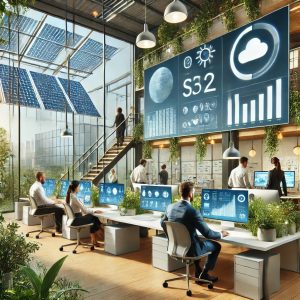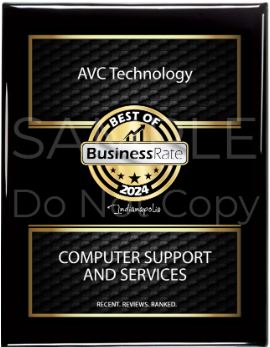 Sustainability isn’t just a buzzword—it’s a smart business strategy. Many companies think "going green" requires significant investments, but small, tech-driven changes can lead to immediate cost savings, improved efficiency, and even a healthier work environment.
Sustainability isn’t just a buzzword—it’s a smart business strategy. Many companies think "going green" requires significant investments, but small, tech-driven changes can lead to immediate cost savings, improved efficiency, and even a healthier work environment.
According to the U.S. Department of Energy, energy-efficient systems can cut energy use by up to 75%. Research also shows that sustainable workplaces experience a 30% reduction in sick days and a noticeable increase in employee productivity. Businesses that embrace sustainability also attract eco-conscious customers, enhance their brand image, and ensure long-term resilience.
But you don’t need a "green-certified" building to see the benefits of sustainability. Below are some practical ways your business can leverage modern technology to reduce waste, lower costs, and improve efficiency.
1. Upgrade to Energy-Efficient Hardware
One of the easiest and most effective ways to make your business more sustainable is by switching to energy-efficient devices. Many businesses still use outdated hardware that consumes excessive power, but upgrading to newer technology can significantly reduce energy costs and environmental impact.
Key Upgrades to Consider:
- ENERGY STAR–Certified Devices: These computers, monitors, and printers use up to 25% less energy than standard equipment.
- Smart Power Strips: These automatically cut power to unused devices, preventing "phantom energy drain."
- Energy-Efficient Printers & Copiers: Models that use lower-power settings and duplex printing help minimize electricity and paper waste.
Investing in modern hardware is not just about saving money—it’s also about future-proofing your operations. Newer devices often have longer lifespans, require fewer repairs, and integrate seamlessly with energy-saving features like smart scheduling and remote power management.
2. Adopt Cloud Computing to Reduce Waste
Traditional IT infrastructure relies on physical servers, cooling systems, and dedicated power supplies, all of which require significant resources to maintain. Cloud computing eliminates the need for on-site servers, offering businesses a more efficient and flexible alternative.
Benefits of Cloud-Based Solutions:
✅ Lower Energy Consumption: Cloud data centers run on optimized infrastructure that is significantly more energy-efficient than on-premise setups.
✅ Pay for What You Use: Instead of maintaining underutilized hardware, cloud platforms scale on demand, minimizing resource waste.
✅ Remote Accessibility: Employees can work from anywhere, reducing the need for office space and cutting commute-related emissions.
Many cloud providers, including Microsoft Azure, AWS, and Google Cloud, are committed to sustainability, using renewable energy sources to power their data centers. Moving to the cloud isn’t just a cost-saving measure—it’s a step toward a smarter, greener business model.
3. Implement Smart Office Solutions with IoT
The Internet of Things (IoT) connects everyday devices to the internet, allowing businesses to monitor and optimize energy use in real time. Implementing IoT solutions can drastically cut waste and automate efficiency improvements.
IoT Devices That Support Sustainability:
- Smart Thermostats (e.g., Nest, Ecobee): These adjust temperature settings based on occupancy, reducing heating and cooling costs by up to 15%.
- Motion-Sensor Lighting: Prevents lights from staying on in unoccupied rooms, lowering electricity use.
- Smart Plugs & Energy Monitors: Track and reduce unnecessary power consumption across devices.
With IoT, businesses gain insights into energy consumption trends and can implement automated solutions that reduce waste without disrupting operations.
4. Reduce Paper Waste with Digital Workflows
Going paperless is one of the easiest and most impactful ways to embrace sustainability. While paper documents are still a necessity for some businesses, shifting to digital alternatives can cut waste, improve productivity, and lower costs.
Ways to Reduce Paper Usage:
📄 Digital Invoicing & Billing: Tools like QuickBooks, Zoho, and FreshBooks eliminate the need for physical invoices.
✍️ E-Signature Platforms: DocuSign and Adobe Sign allow contracts and agreements to be handled digitally.
📂 Cloud Document Storage: Services like Google Drive, OneDrive, and Dropbox replace filing cabinets and make documents more accessible.
If completely eliminating paper isn’t possible, businesses can reduce waste by using recycled paper and duplex printing to minimize unnecessary consumption.
5. Invest in Renewable Energy Solutions
While solar panels and wind turbines might seem like large-scale investments, even small renewable energy solutions can make a difference in sustainability.
Green Energy Solutions for Businesses:
🌞 Solar Charging Stations: Let employees charge their devices using clean energy, reducing dependency on the power grid.
🔋 Battery Storage Systems: Store excess solar energy for use during peak hours, lowering utility costs.
🌱 Green Energy Contracts: Some utility providers offer businesses the option to purchase renewable energy credits or switch to green power plans.
Tax incentives and rebates often help offset the initial cost of renewable energy investments, making it a financially viable strategy for businesses of all sizes.
6. Encourage Sustainable Employee Practices
Technology can support sustainable business practices, but employee habits also play a crucial role. Encouraging eco-friendly workplace behaviors can amplify the impact of your green technology investments.
How to Foster Sustainability Among Employees:
🚴♂️ Promote Remote Work & Virtual Meetings: Reduce unnecessary travel with platforms like Zoom, Microsoft Teams, and Slack.
🌱 Gamify Green Initiatives: Create team challenges to track and reward energy-saving efforts.
🔌 Encourage Device Power Management: Simple practices like shutting down computers at the end of the day reduce energy waste.
By integrating sustainability into your company culture, businesses can achieve long-term environmental and financial benefits.
Sustainability Is Smart Business
Sustainability isn’t just an environmental responsibility—it’s a competitive advantage. Businesses that invest in energy-efficient technology, cloud computing, and green IT solutions save money, boost efficiency, and attract customers who prioritize eco-friendly practices.
But you don’t have to make massive changes overnight. Even small steps, like going paperless, optimizing energy use, or implementing IoT solutions, contribute to a more sustainable and resilient future for your business.
Is your company ready to go green with technology? Start small, track your impact, and watch your savings—and sustainability—grow.










